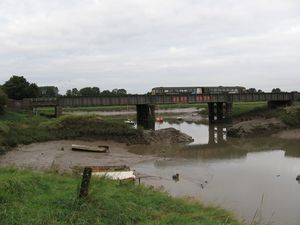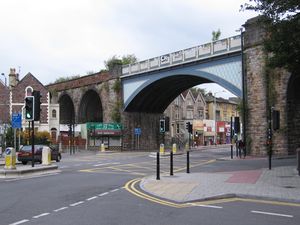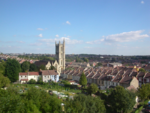Severn Beach Line
| Severn Beach Line |
| Principal stations Bristol Temple Meads |
The Severn Beach Line is a local railway in Bristol, UK. The current line runs from Narroways Junction to Severn Beach, but it is a successor to an earlier railway, known as the Bristol Port Railway and Pier, which ran from a Bristol terminus in the Avon Gorge to a station and pier on the Severn Estuary.
Today, passenger rail services run from Bristol Temple Meads station to Severn Beach, via eight local stations. The line carries little freight traffic, with most of the heavy freight traffic to Avonmouth Docks being routed via a separate freight line through Filton. The line was recently highlighted by Thomas Cook as one of the scenic lines of Europe.[1]
Contents
History
The Bristol Port Railway and Pier
Work began on the 'Bristol Port Railway and Pier' in 1863 and the line was opened two years later on 6 March 1865 with six trains each way on weekdays and four on Sundays.
It originally ran from a station known as Clifton in Hotwells (an area west of Bristol city centre) to Avonmouth, via Sea Mills and Shirehampton. Clifton station was located between the Suspension Bridge and Bridge Valley Road.
As built the railway was totally isolated from the rest of the national network and because of poor finances of the company, plans to extend the railway into the city centre and Temple Meads station were not realised for several more years.
Connection and extension
The Great Western Railway company who ran the Great Western Mainline and the Midland Railway Company which ran the Bristol to Bath Railway and the rest of the midland network decided to jointly fund a branch to Clifton Down connecting to both of their networks at Narroways Junction. This development was accompanied by the opening of Lawrence Hill, Stapleton Road and Montpelier stations. It was quite an achievement, running though cuttings, and tunnels and over embankments and viaducts, the longest and highest as the train travels between Montpelier and Redland. The new section was opened on 1 October 1874.

This led the way to join the two railways up via a mile long tunnel underneath Clifton Down. The section from Clifton Down station to Sneyd Park Junction where it connected to the Bristol Port Railway was finally opened eleven years later on 1 September 1885. As a result of this Clifton Station was renamed Hotwells and the station from here to Sneyd Park Junction track which roughly followed the path of present day A4 Bristol Portway survived until 1922 when it was demolished to build the road.
The residents of Redland successfully petitioned for a station and in April 1897 one was opened close to the Lovers Walk bridge. Unusually the ticket office was on the bridge rather than the platform. St. Andrews Road station was opened in March 1917 in order to serve the munitions factory there which was expected to help with the war effort. Finally Severn Beach station was opened in April 1922.
The line today
Passenger services are operated by First Great Western using Class 143, Class 150, Class 153 or Class 158 diesel multiple unit today. Seven services a day run all the way from Bristol Temple Meads to Severn Beach with a further seven terminating at Avonmouth. Curiously, as trains run to Severn Beach during peak times, the frequency of services is actually reduced during the morning and evening peak because of the longer distance to Severn Beach. On Saturdays all 15 services go to Severn Beach. There is no Sunday service.
The route has been used as a diversionary route for trains travelling north from Bristol, when the normal route is closed for engineering in the past. A freight-only line known as the "Henbury Loop" connects Avonmouth with Bristol Parkway station on the London-South Wales and Bristol-Birmingham routes.
Improved services
Following a successful campaign, Bristol City Council has agreed to subsidise a more frequent service on the line meaning an increase to 2tph. This will come into effect from December 2007[2]
References
- ↑ http://www.bbc.co.uk/insideout/west/series6/railway.shtml
- ↑ BBC News, 2006. "Council introduces train subsidy." 26 January 2007
External links
- http://www.bbc.co.uk/insideout/west/series6/railway.shtml – general information
- http://www.david.frih.net/severn/ - the main source for the historical data included above
- http://www.fosbr.org.uk/ - Friends of Suburban Bristol Railways.
- http://www.bbc.co.uk/dna/actionnetwork/G1517 - Campaign Against New Beeching Report



